| B i o g r a p h y |
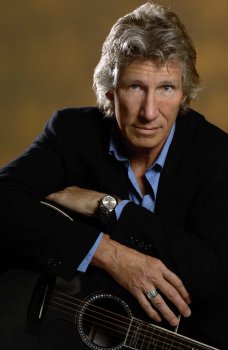 George Roger Waters
(born 6 September 1943) is an English rock musician; singer, bass
guitarist, guitarist, songwriter, and composer. He is best known for
his 1965–1985 career with the band Pink Floyd; he was credited as their
main songwriter (after the departure of Syd Barrett), bass player and
one of their lead vocalists (along with David Gilmour and, to a lesser
extent, Richard Wright). Waters was the lyrical and conceptual
mastermind behind many of the band's concept albums, especially The
Dark Side of the Moon, Wish You Were Here, Animals, The Wall, and The
Final Cut, as well as being the originator of much of the band's
well-known symbolism, such as the Pink Floyd pigs. Following his split
with Pink Floyd in the 1980's, he began a moderately successful solo
career, releasing three studio albums and staging one of the largest
concerts ever, The Wall Concert in Berlin in 1990. In 2005 he released
an opera, Ça Ira, and joined Pink Floyd at the Live 8 concert in
London, on 2 July 2005, for their first public performance with Waters
in 24 years.
George Roger Waters
(born 6 September 1943) is an English rock musician; singer, bass
guitarist, guitarist, songwriter, and composer. He is best known for
his 1965–1985 career with the band Pink Floyd; he was credited as their
main songwriter (after the departure of Syd Barrett), bass player and
one of their lead vocalists (along with David Gilmour and, to a lesser
extent, Richard Wright). Waters was the lyrical and conceptual
mastermind behind many of the band's concept albums, especially The
Dark Side of the Moon, Wish You Were Here, Animals, The Wall, and The
Final Cut, as well as being the originator of much of the band's
well-known symbolism, such as the Pink Floyd pigs. Following his split
with Pink Floyd in the 1980's, he began a moderately successful solo
career, releasing three studio albums and staging one of the largest
concerts ever, The Wall Concert in Berlin in 1990. In 2005 he released
an opera, Ça Ira, and joined Pink Floyd at the Live 8 concert in
London, on 2 July 2005, for their first public performance with Waters
in 24 years.
Born George Roger Waters in Great Bookham, Surrey near Leatherhead,
Waters grew up in Cambridge. Although his father Eric Fletcher Waters
had been a communist and ardent pacifist, he fought in World War II and
died in action at Anzio in 1944, when Waters was only five months old.
Waters would refer or allude to the loss of his father throughout his
work, from "Corporal Clegg" (A Saucerful Of Secrets, 1968), through
"Free Four" (Obscured By Clouds, 1972) and the sombre "When the Tigers
Broke Free", first used in the movie version of The Wall. Waters' loss
is expressed in this latter song:
It was, I recall, in the form of a scroll, with gold leaf and all.
And I found it one day in a drawer of old photographs, hidden away.
And my eyes still grow damp to remember, His Majesty signed in his own rubber stamp."
Another reference to the loss of his father appears in "Three Wishes" from Amused To Death (1992), with the line, "I wish when I was young, my old man had not been gone". Distrust of authority, particularly government, educational, religious and military institutions, is a recurring theme in Waters' writing, and this is perhaps best evidenced in 1979's "The Wall" and 1983's The Final Cut (the latter album, pointedly, is dedicated to his father's memory). He and Syd Barrett attended the Morley Memorial Junior School on Hills Road, Cambridge, and later both attended the Cambridge County School for Boys (now Hills Road Sixth Form College), while fellow band member David Gilmour attended The Perse School on the same road. He met Nick Mason and Rick Wright while attending the Regent Street Polytechnic school of architecture. He was a keen sportsman and was fond of swimming in the River Cam at Grantchester Meadows. At 15 he was chair of YCND in Cambridge.
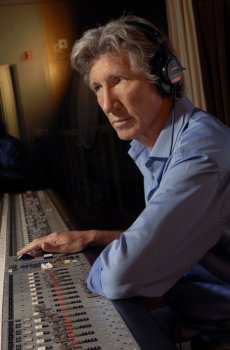 In
1965, Roger Waters co-founded Pink Floyd (after many different
incarnations—see Pink Floyd) along with Syd Barrett, Richard Wright and
Nick Mason. Although Barrett initially did most of the songwriting for
the band, Waters wrote the song "Take Up Thy Stethoscope and Walk" on
their debut LP, The Piper at the Gates of Dawn. The album was a
critical success and positioned the band for stardom. Barrett's
deteriorating mental health led to increasingly erratic behaviour,
rendering him unable to continue in his capacity as Pink Floyd's lead
singer and guitarist. Waters attempted to coerce his friend into
psychiatric treatment; this proved unhelpful, and the band approached
David Gilmour to replace Barrett at the end of 1967. Even the band's
former managers felt that Pink Floyd would not be able to sustain its
initial success without the talented Barrett. Filling the void left by
Barrett's departure, Waters began to chart Pink Floyd's new artistic
direction. The lineup with Gilmour and Waters eventually brought Pink
Floyd to prominence, producing a series of albums in the 1970s that
remain among the most critically acclaimed and best-selling records of
all time. In 1970, Waters collaborated with British composer Ron Geesin
(who co-wrote Pink Floyd's title suite from Atom Heart Mother) on a
soundtrack album, Music from "The Body", which consisted mostly of
instrumentals interspersed with songs composed by Waters. Within Pink
Floyd, Waters became the main lyrical contributor, exerting
progressively more creative control over the band: he produced thematic
ideas that became the impetus for concept albums such as The Dark Side
of the Moon and Wish You Were Here, for which he wrote all of the
lyrics and some of the music. After this, Waters became the primary
songwriter, composing Animals and The Wall largely by himself (though
continuing to collaborate with Gilmour on a few tracks).
In
1965, Roger Waters co-founded Pink Floyd (after many different
incarnations—see Pink Floyd) along with Syd Barrett, Richard Wright and
Nick Mason. Although Barrett initially did most of the songwriting for
the band, Waters wrote the song "Take Up Thy Stethoscope and Walk" on
their debut LP, The Piper at the Gates of Dawn. The album was a
critical success and positioned the band for stardom. Barrett's
deteriorating mental health led to increasingly erratic behaviour,
rendering him unable to continue in his capacity as Pink Floyd's lead
singer and guitarist. Waters attempted to coerce his friend into
psychiatric treatment; this proved unhelpful, and the band approached
David Gilmour to replace Barrett at the end of 1967. Even the band's
former managers felt that Pink Floyd would not be able to sustain its
initial success without the talented Barrett. Filling the void left by
Barrett's departure, Waters began to chart Pink Floyd's new artistic
direction. The lineup with Gilmour and Waters eventually brought Pink
Floyd to prominence, producing a series of albums in the 1970s that
remain among the most critically acclaimed and best-selling records of
all time. In 1970, Waters collaborated with British composer Ron Geesin
(who co-wrote Pink Floyd's title suite from Atom Heart Mother) on a
soundtrack album, Music from "The Body", which consisted mostly of
instrumentals interspersed with songs composed by Waters. Within Pink
Floyd, Waters became the main lyrical contributor, exerting
progressively more creative control over the band: he produced thematic
ideas that became the impetus for concept albums such as The Dark Side
of the Moon and Wish You Were Here, for which he wrote all of the
lyrics and some of the music. After this, Waters became the primary
songwriter, composing Animals and The Wall largely by himself (though
continuing to collaborate with Gilmour on a few tracks).
Waters' band-mates were happy to allow him to write the band's lyrics and guide its conceptual direction while they shared the opportunity to contribute musical ideas (Gilmour described Waters as "a very good motivator and obviously a great lyricist," even at the height of the acrimony between them in 1995). Some of the band's most popular and beloved songs, including "Echoes", "Time", "Us and Them", "Wish You Were Here" and "Shine On You Crazy Diamond", feature the strong synergy of Waters' sharp lyrical instincts combined with the melodic talent of Gilmour, the soft, precise drumming of Nick Mason, and atmospheric patterns of keyboardist Richard Wright ("Us and Them", for instance, began as a sweetly melodic Wright keyboard instrumental and gained poignancy when Waters added plaintive antiwar lyrics). Unfortunately, this give-and-take relationship began to dissolve: a consequence of the band's collective ennui, according to Waters. Song-writing credits were a source of contention in these difficult years; Gilmour has noted that his contributions to tracks like "Another Brick in the Wall, Part II", with its blistering guitar solo, were not always noted in the album credits. Nick Mason addresses the band in-fighting in his memoir, Inside Out: A Personal History of Pink Floyd, characterizing Waters as being egomaniacal at times. It was while recording The Wall that Waters decided to fire Wright, after Wright's personal problems began to affect the album production. Wright stayed with the band as a paid session musician while Waters led the band through a complete performance of his opus on every night of the brief tour that followed (for which Gilmour acted as musical director).
In 1983, the last Waters–Gilmour–Mason collaboration, The Final Cut, was released. The sleeve notes describe it as being a piece "by Roger Waters" that was "performed by Pink Floyd" (rather than an actual Pink Floyd record). So, to many the album came across more like a Roger Waters solo album than Pink Floyd (similar to A Momentary Lapse of Reason and, to a smaller extent, The Division Bell being tagged as Gilmour solo albums). Gilmour unsuccessfully tried to delay production on the album until he could author more material; Waters refused, and in 1985, he proclaimed that the band had dissolved due to irreconcilable differences. The ensuing battle between Waters and Gilmour over the latter's intention to continue to use the name Pink Floyd descended into threatened lawsuits and public bickering in the press. Waters claimed that, as the original band consisted of himself, Syd Barrett, Nick Mason and Richard Wright, Gilmour could not reasonably use the name Pink Floyd now that it was without three of its founding members. Another of Waters' arguments was that he had written almost all of the band's lyrics and a great part of the music after Barrett's departure. However, through agreement, Gilmour and Mason won the right to use the name and a majority of the band's songs, though Waters did retain the rights to the albums The Wall (save for three of the songs that Gilmour co-wrote), Animals, and The Final Cut, as well as claiming ownership of the famous Pink Floyd pigs (although Gilmour circumvented the latter by equipping the 1987 version of the band's pig with a splendid pair of testicles).
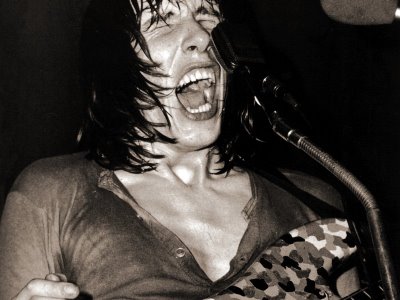 For
many fans and casual listeners, the collaborative years of 1971–1979
remain the "classic" Pink Floyd years due to the albums released and
prominence of Pink Floyd in music culture; a 1987 end-of-year review in
Rolling Stone noted that Waters' solo effort Radio K.A.O.S. and the
post-Waters Pink Floyd album A Momentary Lapse of Reason, if taken
together, might have made a nice follow-up to The Dark Side of the
Moon. In 2005, Waters agreed to rejoin Pink Floyd on stage for Live 8,
and on 2 July 2005, Roger Waters, David Gilmour, Nick Mason, and Rick
Wright performed together on-stage for the first time since the June
1981 Wall concerts at Earl's Court in London.
For
many fans and casual listeners, the collaborative years of 1971–1979
remain the "classic" Pink Floyd years due to the albums released and
prominence of Pink Floyd in music culture; a 1987 end-of-year review in
Rolling Stone noted that Waters' solo effort Radio K.A.O.S. and the
post-Waters Pink Floyd album A Momentary Lapse of Reason, if taken
together, might have made a nice follow-up to The Dark Side of the
Moon. In 2005, Waters agreed to rejoin Pink Floyd on stage for Live 8,
and on 2 July 2005, Roger Waters, David Gilmour, Nick Mason, and Rick
Wright performed together on-stage for the first time since the June
1981 Wall concerts at Earl's Court in London.
After his departure from Pink Floyd, Waters embarked on a solo career producing three concept albums and a movie soundtrack which did not garner impressive sales. His solo work has managed critical acclaim and even some comparison to previous work with Pink Floyd. His first truly solo album, 1984's The Pros and Cons of Hitch Hiking, was a project about a man's dreams across one night. The list of musicians helping Waters during recording included guitarist Eric Clapton and jazz saxophonist David Sanborn. Conceived around the same time as The Wall, the concept was shown and demos played to the Pink Floyd members, but they chose to proceed with The Wall over The Pros and Cons of Hitch Hiking, rejecting the latter as "too personal" (Gilmour was later to claim that this was not as obvious a task as might first seem, as, in his opinion, both demos were "unlistenable" and "sounded exactly alike." Longtime Pink Floyd engineer Nick Griffiths, however, says otherwise: "They were seriously rough, but the songs were there.") The album, not aided by Gerald Scarfe artwork that some claimed was sexist, received mixed reviews, with Kurt Loder describing Pros And Cons Of Hitch Hiking in Rolling Stone as a "strangely static, faintly hideous record," adding that "Waters sounds like the kind of guy who'd bring Hershey bars and nylons along on a first date." (Loder gave the album one star out of five, though user ratings have averaged four out of five). On the other end of the spectrum, Mike DeGagne of the All Music Guide praised the album for its "ingenious symbolism and his brilliant use of stream of consciousness within a subconscious realm," rating it four out of five stars. The resulting concert tour featuring a set design by Marc Brickman and Mark Fisher of Park Display, and, on the first leg, Clapton on lead guitar, was not a success. In 1986 Waters contributed songs and a score to the soundtrack of the movie When the Wind Blows, based on the Raymond Briggs book of the same name. His backing band, featuring Paul Carrack, was credited as The Bleeding Heart Band. Waters' then legal wranglings with Gilmour over the Pink Floyd brand are alluded to on the soundtrack album's "Towers of Faith," where the vocal transforms from "This land is my land," to "This sand is my sand," to "This band is my band."
In 1987 Waters (still accompanied by the Bleeding Heart Band, although not always credited as such) released another concept album, Radio K.A.O.S., about a man named Billy who can hear radio waves in his head. Waters followed the release with a supporting tour, also in 1987. The sound system for the arena portion of the tour used numerous speakers which created a surround sound effect (Waters had already employed Holophonics (only the second act to do so, after Psychic TV) on The Pros and Cons of Hitch Hiking, and QSound on Amused To Death; while K.A.O.S. does not feature any system of spatial encoding, it was lauded for its production and stereo imaging, courtesy of long-time collaborator James Guthrie). Though applauded by many for its contemporary sound, the album did not garner the impressive sales he had achieved in Pink Floyd (years later, Waters himself would express dissatisfaction at the album, expressing distaste for the production, and particularly regretting his decision to trim the album from a double to a single, losing much of the concept in the process). This was possibly attributable to the fact that he was now competing with a reformed Pink Floyd who were touring to support their 'comeback' release, A Momentary Lapse of Reason (which Waters described as, "A very facile but quite fair forgery"). After the Berlin Wall came down in 1989, Waters staged a gigantic charity concert of The Wall in Berlin on July 21, 1990 to commemorate the end of the division between East and West Germany. The concert took place on Potsdamer Platz (a location which was part of the former "no-man's land" of the Berlin Wall), and featured many guest superstars: The Band, Bryan Adams, Cyndi Lauper, Van Morrison, Sinéad O'Connor, The Hooters, The Scorpions, Marianne Faithfull, and Joni Mitchell. It was one of the biggest concerts ever staged with an attendance of over 300,000 and was watched live by over five million people worldwide. However, the initial funds raised from the concert barely covered expenses, although syndication and home-video sales allowed Waters to present his chosen charity to benefit from the event, The Leonard Cheshire Foundation, with a sizeable donation.
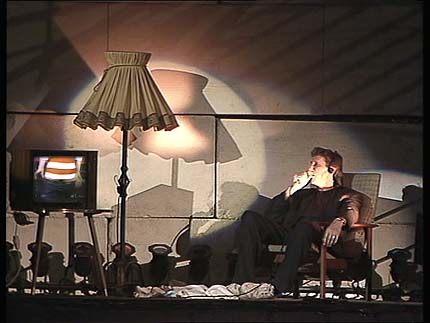 1992's
Amused to Death, about the corrupting, desensitising nature of
television, is perhaps Waters' most critically acclaimed solo
recording, with music critics comparing it to later Pink Floyd work,
such as The Wall (Waters himself describes the record as the third in a
thematically-linked trilogy, after Dark Side Of The Moon and The Wall).
The album had one hit which was "What God Wants, Pt. 1" which hit #4 on
Mainstream Rock charts. Jeff Beck, another legendary guitarist, saw
action on Waters's album as he played lead guitar. There was no tour in
support of this record, although Waters would later perform several
songs from this record nearly eight years later on his In the Flesh
tours. In 1999 Waters embarked on the In the Flesh tour which saw him
performing some of his most famous work, both solo and Pink Floyd
material. The tour was a success in the US, and after Waters had booked
mostly smaller venues (after the let-down in attendance from his 1987
tour), tickets sold so well that most of the concerts had to be
upgraded to larger venues. With Gilmour's Pink Floyd retiring after
1994, and many Floyd albums selling at the pace of Beatles records,
Waters was in great demand. The tour eventually stretched across the
world. Tickets were at such high demand, that the tour had to be
spanned over three years. Almost every show was sold out with some
venues garnering more sales than Pink Floyd shows of early touring
years. One concert (Filmed in Portland, Oregon) was released on CD and
DVD, named In the Flesh Live, after the tour. During this tour he
played two new songs from his next solo album, "Flickering Flame" and
"Each Small Candle," as the final encore to the show. In 2002 Waters
performed at a concert organised by the Countryside Alliance. In June
of 2002 Waters played the Glastonbury Festival performing many classic
Pink Floyd songs. This was the first time a special speaker system had
been set up among the Glastonbury audience to enable sound effects to
appear to be moving around amongst the crowd.
1992's
Amused to Death, about the corrupting, desensitising nature of
television, is perhaps Waters' most critically acclaimed solo
recording, with music critics comparing it to later Pink Floyd work,
such as The Wall (Waters himself describes the record as the third in a
thematically-linked trilogy, after Dark Side Of The Moon and The Wall).
The album had one hit which was "What God Wants, Pt. 1" which hit #4 on
Mainstream Rock charts. Jeff Beck, another legendary guitarist, saw
action on Waters's album as he played lead guitar. There was no tour in
support of this record, although Waters would later perform several
songs from this record nearly eight years later on his In the Flesh
tours. In 1999 Waters embarked on the In the Flesh tour which saw him
performing some of his most famous work, both solo and Pink Floyd
material. The tour was a success in the US, and after Waters had booked
mostly smaller venues (after the let-down in attendance from his 1987
tour), tickets sold so well that most of the concerts had to be
upgraded to larger venues. With Gilmour's Pink Floyd retiring after
1994, and many Floyd albums selling at the pace of Beatles records,
Waters was in great demand. The tour eventually stretched across the
world. Tickets were at such high demand, that the tour had to be
spanned over three years. Almost every show was sold out with some
venues garnering more sales than Pink Floyd shows of early touring
years. One concert (Filmed in Portland, Oregon) was released on CD and
DVD, named In the Flesh Live, after the tour. During this tour he
played two new songs from his next solo album, "Flickering Flame" and
"Each Small Candle," as the final encore to the show. In 2002 Waters
performed at a concert organised by the Countryside Alliance. In June
of 2002 Waters played the Glastonbury Festival performing many classic
Pink Floyd songs. This was the first time a special speaker system had
been set up among the Glastonbury audience to enable sound effects to
appear to be moving around amongst the crowd.
Miramax Films announced in mid-2004 that a production of The Wall was to appear on Broadway with Waters playing a prominent part in its production. Reports stated that the musical contained not only the original tracks from "The Wall," but also songs from Dark Side of the Moon, Wish You Were Here and other Pink Floyd albums, as well as new material. On the night of 1 May 2004, the overture for Ça Ira was pre-premièred on occasion of the Welcome Europe celebrations in the accession country of Malta, performed over Grand Harbour in Valletta and illuminated by light artist Gert Hof. The event was broadcast over all EBU television stations. In September 2004, Waters released two new tracks, "To Kill The Child" and "Leaving Beirut." These were released only on the Internet. Both of these tracks were inspired by the U.S./UK 2003 invasion of Iraq. Waters, who currently resides in the U.S., has said that the songs were written immediately after the start of the war, but he delayed releasing them until just before the 2004 Presidential election, hoping to derail George W. Bush's re-election. The lyrics in "Leaving Beirut" included "Oh George! Oh George! That Texas education must have fucked you up when you were very small." Although the songs' criticism was primarily aimed at the American government, Tony Blair is also referenced: "Not in my name, Tony, you great war leader, you." The songs were also released as a limited edition on CD in Japan. After the 2004 Indian Ocean Earthquake and subsequent tsunami disaster, Waters performed "Wish You Were Here" with Eric Clapton during a benefit concert on the American network NBC.
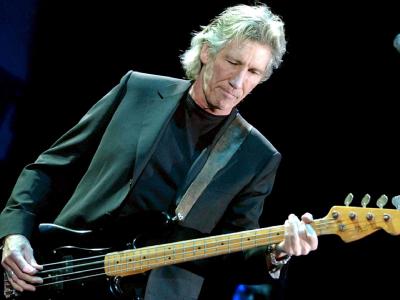 On
July 2, 2005 Waters and Pink Floyd reunited for a performance at the
Live 8 concert. They played a six-song, 23-minute set, including "Speak
to Me/Breathe"/"Breathe (Reprise)", "Money", "Wish You Were Here", and
"Comfortably Numb". Before going into "Wish You Were Here", Waters said:
On
July 2, 2005 Waters and Pink Floyd reunited for a performance at the
Live 8 concert. They played a six-song, 23-minute set, including "Speak
to Me/Breathe"/"Breathe (Reprise)", "Money", "Wish You Were Here", and
"Comfortably Numb". Before going into "Wish You Were Here", Waters said:
Waters remarked shortly after Live 8 to the Associated Press that, while the experience of playing as Pink Floyd again was positive, the chances of a bona fide reunion would be "slight", considering his and Gilmour's continuing musical and ideological differences. During an interview with Rolling Stone, Waters further denied the possibility of a future Pink Floyd tour, saying "I didn't mind rolling over for one day, but I couldn't roll over for a whole fucking tour." He has since stated on a radio interview that he would be interested in the possibility of recording a new album with the rest of Pink Floyd as long as he had creative control. However, David Gilmour has said on several occasions that he is retired from extensive touring, shedding more doubt on the possibility of a bona fide Pink Floyd reunion tour. Waters is known to be working on two new solo albums (as remarked to Jim Ladd, with whom he worked on Radio K.A.O.S.): one has the working title of Heartland. Two new songs that might appear on this album have been released on Flickering Flame: The Solo Years Vol. 1: "Each Small Candle" and "Flickering Flame". The other of the two albums deals with the theme of love, much in the vein of Pros and Cons. A work-in-progress, which may appear on this album and was dubbed "Woman" by bootleggers, was heard during the sound checks for the In the Flesh tour. However, in a recent telephone interview, he confirmed that the release of his next project has been delayed due to not having a concept to draw all the individual songs together into one piece.
In February of 2005 , it was announced on Roger Waters' website that his opera, Ça Ira, had been completed after 16 years of work. It was released as a CD/DVD set by Sony Classical on September 27, 2005 with Baritone Bryn Terfel, soprano Ying Huang and tenor Paul Groves. The original libretto was written in French by the late Étienne Roda-Gil, who set the opera during the optimistic days of the early French Revolution. From 1997 Waters rewrote the libretto in English. On May 20, 2006 he performed with a set band consisting of Roger Taylor and Eric Clapton and former band-mate Nick Mason performing two songs, "Wish You Were Here", and "Comfortably Numb".
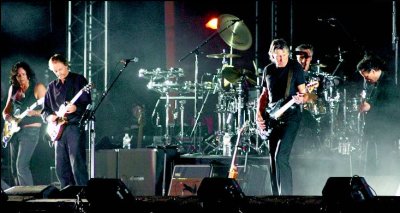 Roger
Waters toured Europe during the Summer of 2006 and North America in the
fall for his The Dark Side of the Moon Live Tour. As part of his
performance he played a complete run-through of the 1973 Pink Floyd
classic, The Dark Side of the Moon, as the second half of the show. The
first half was a mix of Floyd classics and Waters' solo material.
Elaborate staging designed by Marc Brickman, complete with projections,
and a full, 360 degree quadrophonic sound system were used. This new
Waters' solo tour is expected to be as successful as his previous In
the Flesh tour. His former Pink Floyd bandmate, Nick Mason joined
Waters on some of the tour dates. Richard Wright was invited to
participate on the tour as well but he declined the offer to work on
solo projects. There is also a 2007 leg of the Tour, starting in
January in Australia, followed by New Zealand and going through Asia,
Europe, South America, and finally North America in June. Waters'
former bandmate Nick Mason began patching their relationship in 2002.
After speaking to Mason and Bob Geldof about a possible Pink Floyd
reunion at Live 8, Waters contacted Gilmour by phone and e-mail, and it
appears that they have buried the hatchet since the historic concert
and now communicate on a friendly basis. Waters has made overtures to
Richard Wright, as well. Syd Barrett, who died on Friday 7 July 2006,
remained an emotional subject for most of his friends and former
colleagues. Waters said in interviews before Barrett's death that it
would be difficult and inappropriate for him to try to insert himself
back into his old friend's life. Waters performed another Dark Side of
the Moon concert in the summer of 2007.
Roger
Waters toured Europe during the Summer of 2006 and North America in the
fall for his The Dark Side of the Moon Live Tour. As part of his
performance he played a complete run-through of the 1973 Pink Floyd
classic, The Dark Side of the Moon, as the second half of the show. The
first half was a mix of Floyd classics and Waters' solo material.
Elaborate staging designed by Marc Brickman, complete with projections,
and a full, 360 degree quadrophonic sound system were used. This new
Waters' solo tour is expected to be as successful as his previous In
the Flesh tour. His former Pink Floyd bandmate, Nick Mason joined
Waters on some of the tour dates. Richard Wright was invited to
participate on the tour as well but he declined the offer to work on
solo projects. There is also a 2007 leg of the Tour, starting in
January in Australia, followed by New Zealand and going through Asia,
Europe, South America, and finally North America in June. Waters'
former bandmate Nick Mason began patching their relationship in 2002.
After speaking to Mason and Bob Geldof about a possible Pink Floyd
reunion at Live 8, Waters contacted Gilmour by phone and e-mail, and it
appears that they have buried the hatchet since the historic concert
and now communicate on a friendly basis. Waters has made overtures to
Richard Wright, as well. Syd Barrett, who died on Friday 7 July 2006,
remained an emotional subject for most of his friends and former
colleagues. Waters said in interviews before Barrett's death that it
would be difficult and inappropriate for him to try to insert himself
back into his old friend's life. Waters performed another Dark Side of
the Moon concert in the summer of 2007.
He contributed to the The Last Mimzy soundtrack with award-winning composer Howard Shore in March 2007. His song, "Hello (I Love You)", was played during the credits of the film. Waters commented on its development: "I think together we've come up with a song that captures the themes of the movie - the clash between humanity's best and worst instincts, and how a child's innocence can win the day." In March 2007, Roger Waters told Rolling Stone magazine that he would be a performer at the U.S. leg of the Live Earth event--an international multi-venue concert aimed to raise awareness about global climate change. At that time he also confirmed that his former Pink Floyd bandmates would not be joining him at the event. On July 7th, 2007, Waters played at Live Earth, performing the intro to "In the Flesh", "Money", "Us and Them", "Brain Damage", and "Eclipse". Waters finished off with "The Happiest Days of Our Lives" and "Another Brick in the Wall (Part II)", featuring the Trenton Youth Choir and his trademark inflatable pig. Waters has also recently become a spokesperson for Millennium Promise, a non-profit organisation that helps fight extreme poverty and malaria. He wrote a special commentary for CNN's website on June 11, 2007 about the topic. Roger Waters will continue his The Dark Side of the Moon Live tour in 2008. It is still unknown how many dates are planned, but as of December 21, 2007, a concert in The Netherlands May 11, and a concert in Denmark May 13, have been announced and are currently on sale. Waters will also be performing at the Coachella Festival in April. He will also be doing three dates in the UK, one being 15th May at the new Liverpool Echo arena, the remaining to at the O2 arena in London on the 18th & 19th, plus an additional date in Russia to round up his 2008 DSOTM tour. Waters has made his views about the 2008 United States Presidential election clear. During his concert appearance at the Coachella Festival on April 27th, 2008, he released the trademark Pink Floyd inflatable pig into the air with the words "Don't be led to the slaughter" written on one side, next to a cartoon of Uncle Sam holding meat cleavers. "Fear builds walls" was written on the pig's other side and "Impeach Bush" on the pig's behind. On the pig's belly was Democratic Presidential candidate Barack Obama's name with a check mark beside it. Waters has referred to Hillary Clinton, another Democratic candidate, as "ghastly".